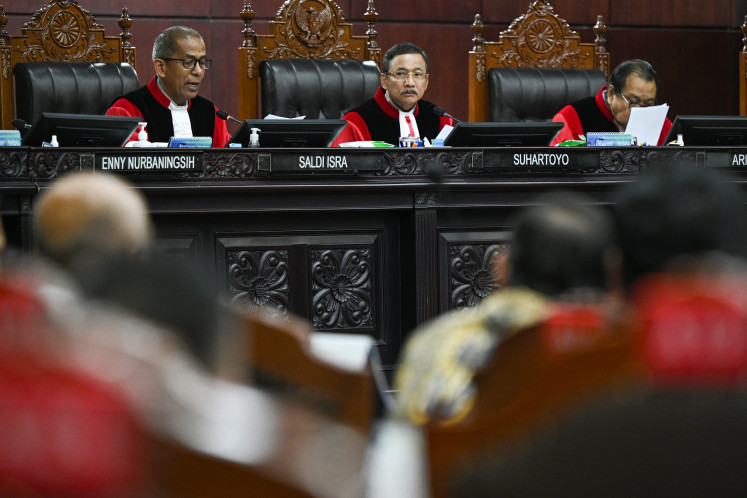Popular Reads
Top Results
Can't find what you're looking for?
View all search resultsPopular Reads
Top Results
Can't find what you're looking for?
View all search resultsHouse seats for women could decline
Female legislative candidates and activists remain pessimistic that their representation at the House of Representatives could drop drastically
Change text size
Gift Premium Articles
to Anyone
Female legislative candidates and activists remain pessimistic that their representation at the House of Representatives could drop drastically.
The concern stems from the fact that the state seems unwilling to guarantee an increase in House seats for women, while, political parties have been stripped of any internal mechanism to ensure more female legislators represent them, politicians say.
The Constitutional Court's ruling to scrap Article 214 of the 2008 Legislative Elections Law — which allowed parties to determine their representatives in legislative bodies based on a hierarchical system of seat distribution, rather than giving seats to candidates who win the most votes — has been deemed a huge blow for female candidates.
Political parties are now afraid that making an internal ruling to allocate women one of every three seats could violate the law.
Ratna Batara Munti, a legislative candidate from the Indonesian Democratic Party of Struggle (PDI-P), said the number of women at the next House could fall far below the 11 percent attained in the last elections in 2004.
“The political gender gap remains wide. It has worsened because no party has set an internal policy to ensure women get 30 percent of House seats,” she told The Jakarta Post.
“Unfortunately, the government has no political will to give women more chances at the House,” said Ratna, a former women's activist now contesting the East Java VII electoral district that comprises Pacitan, Ponogoro, Trenggalek, Magetan and Ngawi.
Legislative elections will be held on April 9, with more than 12,000 candidates vying for 560 House seats.
The total is an increase from the current 550 seats, 11 percent of which are occupied by women.
The highest occurrence of women at the House was during the 1987-1992 period, when women occupied 13 percent or 65 seats, before dipping to 9 percent in the 1999-2004 period.
Golkar, the country's largest party, said it could not make a special exception for women, for fear of violating the law.
“Golkar has a policy of giving a seat to a female candidate, if a female and male candidate win the same number of votes. It is our way of respecting women,” said Golkar member Firman Soebagyo.
“But we can’t go as far as awarding one seat for women out of every three seats won in electoral districts. That violates the law."
The General Elections Commission (KPU) has given up on efforts to issue a ruling requiring parties to award women 30 percent of their House seats, after its request for a government regulation-in-lieu-of law (perppu) was rejected.










